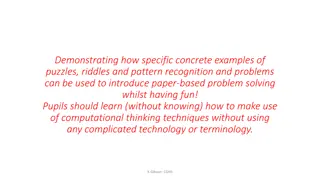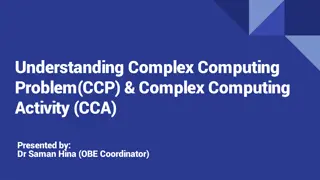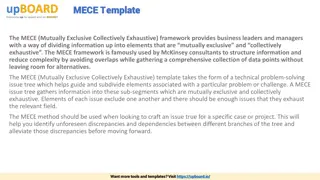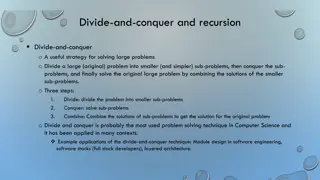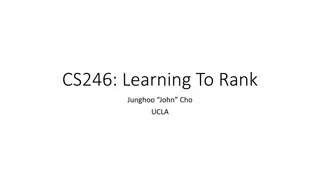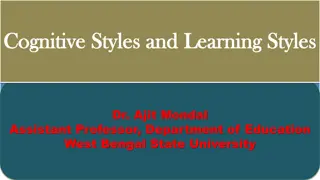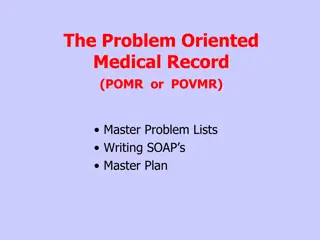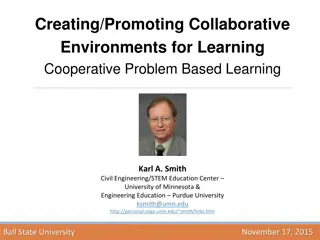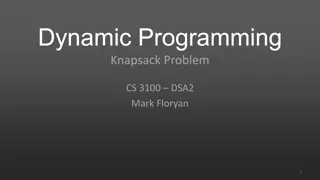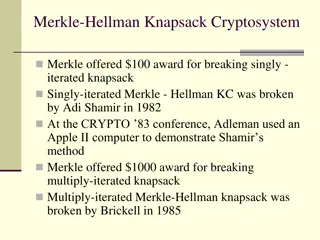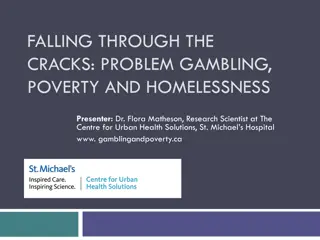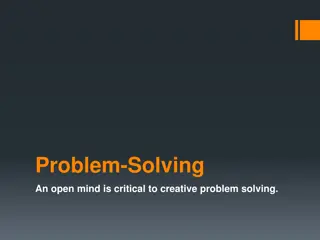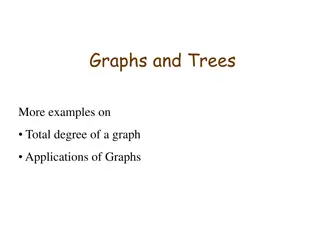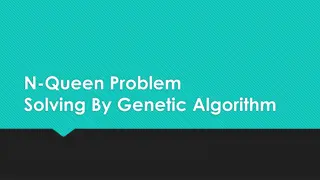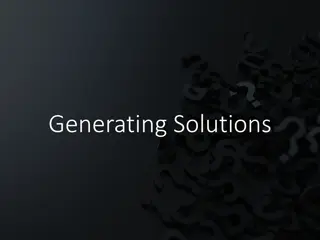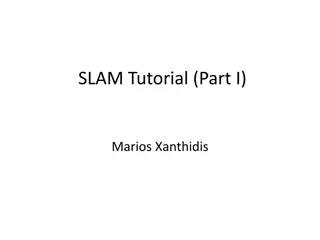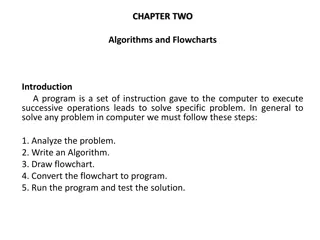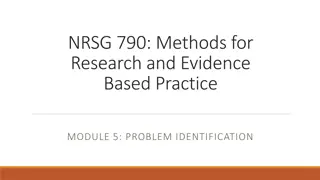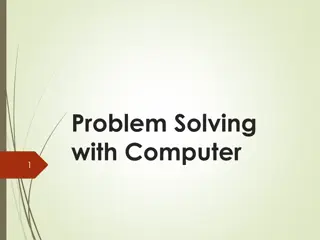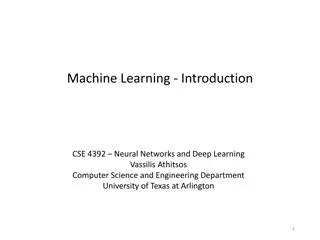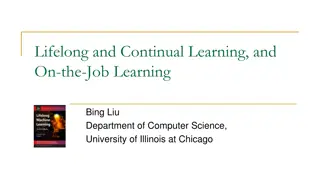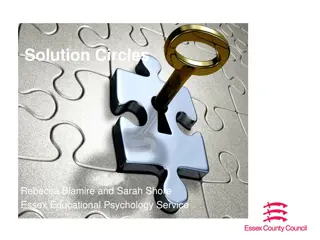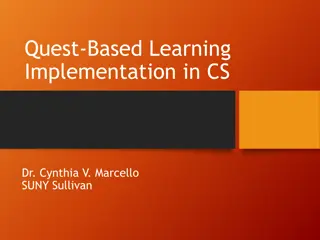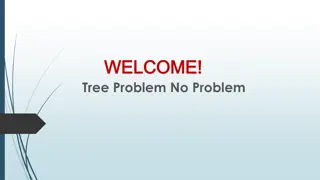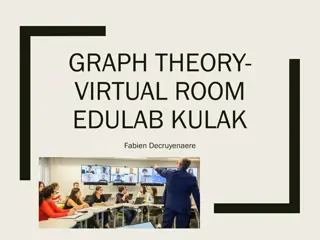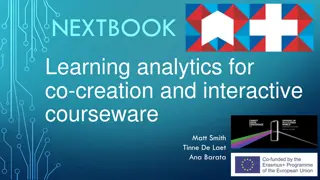Famous Sexologist in Patna and Lakhisarai over phone | Dr. Sunil Dubey
Do you live in Lakhisarai city which is the administrative headquarters of Lakhisarai district in Bihar, India? Actually, this city is famous for its Ashok Dham temple in India. Right now you are sad because of your sexual problem. This sexual problem not only troubles you but is also spoiling your
17 views • 6 slides
Exploring Small Group Teaching and Flipped Classrooms
This insightful presentation delves into the framework, advantages, ways to incorporate, and pros and cons of small group teaching and flipped classrooms. It covers topics such as active learner engagement, creating safe learning environments, and the benefits of a flipped classroom approach. The co
1 views • 18 slides
Solving the Missionaries and Cannibals River Crossing Problem
Consider the classic problem of three missionaries and three cannibals needing to cross a river using a canoe that can hold up to two people. The challenge is to transport everyone safely without leaving more cannibals than missionaries on either side of the river. Learn about search problem formula
0 views • 124 slides
Understanding the LIBRE Model Stick Figure Tool for Scoring and Engagement Style Analysis
The LIBRE Model Stick Figure Tool is designed for problem-solving exchanges between a problem-solver and a facilitator. It involves five prompts - Listen, Identify, Brainstorm, Reality-test, and Encourage - aimed at self-reflection and behavior modification. The model emphasizes self-regulated atten
0 views • 34 slides
Comprehensive Overview of Problem-Oriented Medical System in Physiotherapy Assessment
In the realm of physiotherapy assessment, the Problem-Oriented Medical System (POMS) plays a vital role in accurately defining patient problems, creating treatment plans, and monitoring progress. This system, pioneered by Weed in 1968, consists of Problem-Oriented Medical Records (POMR), auditing, a
2 views • 34 slides
Engaging Paper-Based Problem Solving for Computational Thinking Skills
Implementing paper-based problem-solving activities using puzzles, riddles, and pattern recognition can effectively introduce computational thinking without the need for complex technology or terminology. Through real-life scenarios like transporting a fox, chicken, and corn across a river or encodi
0 views • 23 slides
Understanding Complex Computing Problem (CCP) and Complex Computing Activity (CCA)
Dr. Saman Hina, along with Dr. Farrukh Arif and Dr. Maria Waqas, presents information on Complex Computing Problem (CCP) - a problem involving technical, computing, and other issues with no obvious solution, requiring deep knowledge and analytical thinking. CCP is evaluated through predefined rubric
4 views • 19 slides
Overview of Research Problem Identification and Formulation
Understanding the importance of defining a research problem, this content delves into the selection and formulation of research problems, the definition of a research problem, reasons for defining it, methods for identifying research problems, sources of research problems, and considerations in sele
1 views • 11 slides
Experiential Learning Portfolio Program at Barry University
Experiential Learning Portfolio Program at Barry University's School of Professional and Career Education (PACE) offers a unique opportunity to earn college credit for learning gained from work and community service experiences. Through this program, students can showcase their experiential learning
0 views • 16 slides
Understanding the MECE Framework for Efficient Problem-Solving
The MECE (Mutually Exclusive, Collectively Exhaustive) framework is a powerful tool used by business leaders and consultants like McKinsey to structure information, reduce complexity, and gather comprehensive data without overlaps. It involves creating issue trees that subdivide problem elements int
1 views • 4 slides
Innovative Learning Management System - LAMS at Belgrade Metropolitan University
Belgrade Metropolitan University (BMU) utilizes the Learning Activity Management System (LAMS) to enhance the learning process by integrating learning objects with various activities. This system allows for complex learning processes, mixing learning objects with LAMS activities effectively. The pro
4 views • 16 slides
Uninformed Search Chapter 3 - Goal-based Agents and Problem Solving
Discussing goal-based agents and problem solving in artificial intelligence, the chapter covers topics such as representing states and actions, various search algorithms like breadth-first and depth-first search, as well as the problem space principle developed by Allen Newell and Herb Simon. Exampl
2 views • 52 slides
Solving the Professors to Coffee Lounge Problem: A Graph Theory Approach
An intriguing mathematical problem is presented where new faculty members at TIMS must be assigned to coffee lounge alcoves in a way that ensures no two new members meet after the first day. By constructing a graph based on meet-up timings, analyzing clashes, and determining intervals, this scenario
1 views • 19 slides
Divide and Conquer: A Strategy for Problem Solving
Divide-and-conquer is a powerful problem-solving technique in Computer Science where a large problem is divided into smaller sub-problems, conquered individually, and then combined to solve the original problem. Through three steps - Divide, Conquer, and Combine - complex problems can be efficiently
3 views • 18 slides
Learning to Rank in Information Retrieval: Methods and Optimization
In the field of information retrieval, learning to rank involves optimizing ranking functions using various models like VSM, PageRank, and more. Parameter tuning is crucial for optimizing ranking performance, treated as an optimization problem. The ranking process is viewed as a learning problem whe
0 views • 12 slides
Understanding Cognitive Styles and Learning Styles in Education
Cognitive styles explore an individual's preferred way of thinking and problem-solving, while learning styles delve into how individuals acquire and process information. These styles influence attitudes, values, and social interactions. By understanding one's own cognitive and learning styles, one c
0 views • 24 slides
Comprehensive Guide to Problem Oriented Medical Record (POMR) and Master Problem Lists
Delve into the world of Problem Oriented Medical Records (POMR) and Master Problem Lists (MPL) through the insightful teachings of Dr. Lawrence Weed. Learn the systematic approach, SOAP writing, and the significance of maintaining a patient-focused perspective. Understand the challenges in diagnosis
0 views • 35 slides
Understanding the Cold Start Problem in Recommender Systems
Targeting new users or items with limited or no information, the cold start problem poses challenges due to a lack of data. Strategies like knowledge-based, content-based, and collaborative filtering are discussed along with methods like neighbor clustering and hybrid approaches. Techniques such as
0 views • 19 slides
Promoting Collaborative Environments for Cooperative Problem-Based Learning
Explore key concepts in creating, promoting, and structuring collaborative environments for cooperative problem-based learning in educational settings. Learn essential features of effective teamwork, high-performing teams, and formal cooperative learning. Discover strategies to increase student enga
0 views • 62 slides
Understanding the Knapsack Problem in Dynamic Programming
Explore the concept of the Knapsack Problem in dynamic programming, focusing on the 0/1 Knapsack Problem and the greedy approach. Understand the optimal substructure and greedy-choice properties, and learn how to determine the best items to maximize profit within a given weight constraint. Compare t
0 views • 23 slides
Overview of Knapsack Cryptosystems and Related Problems
The Merkle-Hellman knapsack cryptosystem is a cryptographic system that was initially proposed by Merkle, and later iterated versions were both broken by Shamir and Brickell in the early 1980s and 1985, respectively. This system is related to the classical knapsack problem, subset-sum problem, and e
0 views • 18 slides
Impact of Problem Gambling on Poverty and Homelessness
Problem gambling is a significant public health concern leading to financial harm, emotional distress, relationship disruptions, and even homelessness. Men experiencing poverty and homelessness are more susceptible to problem gambling, creating a detrimental cycle. Factors like income level, race, a
0 views • 12 slides
The Importance of Problem-Solving Skills in Everyday Life
Developing effective problem-solving skills is crucial as they play a significant role in various aspects of our daily lives, from simple tasks to complex challenges. This article explores the significance of problem-solving, provides strategies like algorithms and heuristics, discusses obstacles en
0 views • 34 slides
Insights into Polynomials Vanishing on Cartesian Products and the 3POL Problem
This joint work explores polynomials vanishing on Cartesian products, focusing on the 3POL problem involving three sets of points and a 6-variate polynomial. It discusses the running time of solving the explicit 3POL problem and compares it to the well-studied 3SUM problem in theoretical computer sc
0 views • 29 slides
Interesting Graphs and Puzzles for Problem-Solving Enthusiasts
Explore various scenarios involving graph theory and puzzles like handshakes at a party, a tricky river crossing situation with multiple constraints, a jug measuring problem, and the classic Rubik's cube challenge. Also, ponder over a cash exchange problem faced by a group dining at a restaurant. Th
0 views • 8 slides
Solving N-Queen Problem Using Genetic Algorithm
Solving the N-Queen problem involves placing queens on a chessboard in such a way that they cannot check each other. The genetic algorithm approach addresses this problem through representations like phenotype and genotype, fitness evaluation based on queen penalties, mutations involving permutation
0 views • 8 slides
Enhancing Creativity and Problem Solving Techniques
Explore key outcomes in fostering creativity, identifying and removing blocks to problem-solving, and understanding the process of generating new ideas through concepts like creativity vs critical thinking and block-busting. Learn strategies including brainstorming, defer judgment, and morphological
0 views • 15 slides
Enhancing Problem-Solving Skills in Mathematics Workshops
In this workshop focused on problem-solving in mathematics, participants engage in various tasks and activities to develop a deep understanding of problem-solving strategies. The key messages emphasize the importance of integrating problem-solving into daily mathematics learning, utilizing multiple
0 views • 34 slides
Historical Overview of the SLAM Problem
The SLAM problem, a challenging task in mobile robotics, involves creating maps and determining a robot's pose in an unknown environment. Over time, researchers have made significant progress in solving this problem, dating back to the initial probabilistic methods for localization and mapping in 19
0 views • 29 slides
Introduction to Algorithms and Flowcharts
A program consists of instructions given to a computer to execute operations and solve specific problems. To solve a problem in computers, steps like analyzing the problem, writing an algorithm, creating flowcharts, converting flowcharts to programs, and testing the solution must be followed. Algori
1 views • 18 slides
Largest Red-Blue Separating Rectangles Study
This study explores the problem of finding the largest area axis-aligned B-empty rectangle containing n red points and m blue points. The research discusses various extensions to the original problem, such as the Blue Rectangles problem and the Outliers Problem, aiming to achieve efficient solutions
0 views • 20 slides
Research Methods and Evidence-Based Practice for Problem Identification
This module focuses on problem identification in research and evidence-based practice, emphasizing the importance of identifying the problem before seeking a solution. It covers components of the PICO framework, constructs well-built clinical questions, and provides examples related to hospitalized
0 views • 6 slides
Problem-Solving Process with Computers
Utilizing computers to solve problems involves various stages such as problem analysis, algorithm development, flowcharting, programming, compilation, debugging, and documentation. It is crucial to plan and understand the problem thoroughly before coding to ensure accurate results. Each step in the
0 views • 55 slides
Understanding Machine Learning: Types and Examples
Machine learning, as defined by Tom M. Mitchell, involves computers learning and improving from experience with respect to specific tasks and performance measures. There are various types of machine learning, including supervised learning, unsupervised learning, and reinforcement learning. Supervise
0 views • 40 slides
Lifelong and Continual Learning in Machine Learning
Classic machine learning has limitations such as isolated single-task learning and closed-world assumptions. Lifelong machine learning aims to overcome these limitations by enabling models to continuously learn and adapt to new data. This is crucial for dynamic environments like chatbots and self-dr
0 views • 32 slides
Solution Circles: A Creative Problem-Solving Tool
Solution Circles is a powerful problem-solving tool that involves a problem presenter, process facilitator, note taker, and brainstorm team. The process includes outlining the problem, brainstorming creative solutions, positive dialogue, and setting achievable first steps within a short timeframe. T
0 views • 10 slides
Implementing Quest-Based Learning in Computer Science Education
Quest-Based Learning (QBL) is an instructional design theory leveraging game mechanics to enhance student choice and engagement in CS courses. Utilizing missions, systems thinking, play design, intelligent resourcing, attribution of meaning, and experimentation mindset, QBL fosters problem-solving,
0 views • 25 slides
Best Tree removal Services in Sheldon
If you want the Best Tree removal Services in Sheldon, visit Tree Problem No Problem. Tree Problem No Problem is your local arborist and tree services provider in Thornlands, Queensland. Their specialized experts have been in the trade for more than
1 views • 6 slides
Exploring Graph Theory: From Knigsberg Bridge Problem to Traveling Salesman Problem
Delve into the realm of graph theory with a historical perspective on the Knigsberg Bridge Problem and advancements like the Traveling Salesman Problem. Uncover the foundations of non-directed graphs, Hamiltonian graphs, and their real-world applications.
0 views • 21 slides
Enhancing Learning Through Co-Created Interactive Courseware and Learning Analytics
Explore the innovative concept of co-creation in interactive courseware and learning analytics to improve student learning outcomes. Discover how students collaborate in a social learning environment, track their progress, and engage in dialogic and constructive pedagogical strategies. Harness the p
0 views • 19 slides





